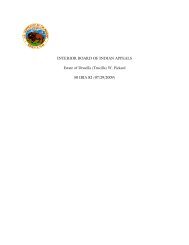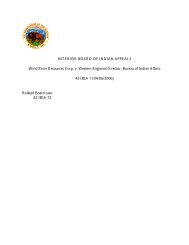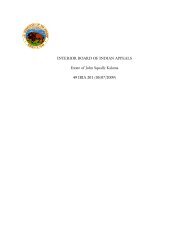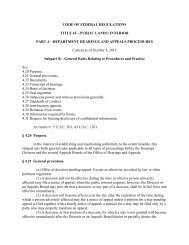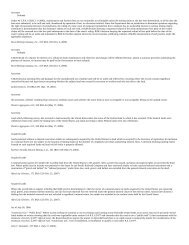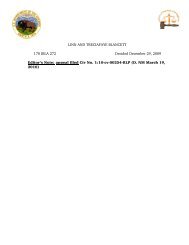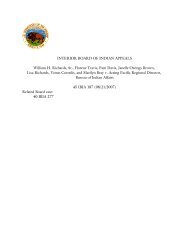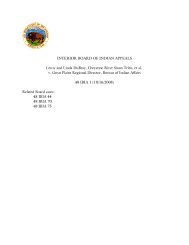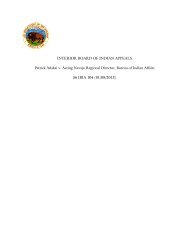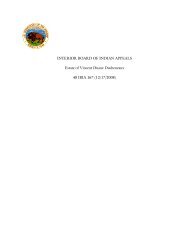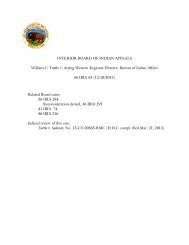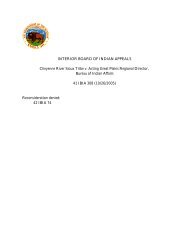54 IBIA 236 - About the Office of Hearings and Appeals
54 IBIA 236 - About the Office of Hearings and Appeals
54 IBIA 236 - About the Office of Hearings and Appeals
You also want an ePaper? Increase the reach of your titles
YUMPU automatically turns print PDFs into web optimized ePapers that Google loves.
INTERIOR BOARD OF INDIAN APPEALS<br />
Estate <strong>of</strong> Clayton Donald Mountain Pocket<br />
<strong>54</strong> <strong>IBIA</strong> <strong>236</strong> (02/07/2012)<br />
Petition for reconsideration dismissed:<br />
55 <strong>IBIA</strong> 99<br />
Judicial review <strong>of</strong> this case:<br />
Dismissed, Larry Costa <strong>and</strong> Victor Singer v. United States, No. CV-12-33-BLG-RFC-CSO<br />
(D. Mont. Oct. 5, 2012)
United States Department <strong>of</strong> <strong>the</strong> Interior<br />
OFFICE OF HEARINGS AND APPEALS<br />
INTERIOR BOARD OF INDIAN APPEALS<br />
801 NORTH QUINCY STREET<br />
SUITE 300<br />
ARLINGTON, VA 22203<br />
ESTATE OF CLAYTON DONALD<br />
MOUNTAIN POCKET<br />
)<br />
)<br />
)<br />
)<br />
)<br />
)<br />
)<br />
)<br />
)<br />
)<br />
Order Reversing Decision in Part <strong>and</strong><br />
Giving Effect to Decision in<br />
Remaining Part<br />
Docket Nos. <strong>IBIA</strong> 09-121<br />
09-122<br />
09-123<br />
09-124<br />
February 7, 2012<br />
Darrell Bear Cloud, Dana Bear Cloud Birdin Ground, Larry Bear Cloud, <strong>and</strong><br />
Christina Bear Cloud (collectively, Appellants) appealed to <strong>the</strong> Board <strong>of</strong> Indian <strong>Appeals</strong><br />
(Board) from an Order Denying Rehearings (Rehearing Order) entered by Indian Probate<br />
Judge (IPJ) Albert C. Jones in <strong>the</strong> estate <strong>of</strong> Appellants’ adoptive cousin, Clayton Donald<br />
1<br />
Mountain Pocket (Decedent), deceased Crow Indian, Probate No. P000047331IP.<br />
Appellants are beneficiaries <strong>of</strong> Decedent’s will, which <strong>the</strong> IPJ disapproved solely on <strong>the</strong><br />
ground that a presumption <strong>of</strong> undue influence applied <strong>and</strong> had not been rebutted by<br />
Appellants. After disapproving <strong>the</strong> will, <strong>the</strong> IPJ concluded that, notwithst<strong>and</strong>ing<br />
Decedent’s adoption, <strong>the</strong> surviving issue <strong>of</strong> Decedent’s natural parents — Larry Singer<br />
Costa, <strong>and</strong> Victor, Susie, <strong>and</strong> Martha Singer (collectively, <strong>the</strong> Singers) — remained his<br />
“siblings” <strong>and</strong> thus were entitled to inherit from Decedent under <strong>the</strong> American Indian<br />
Probate Reform Act <strong>of</strong> 2004 (AIPRA), see 25 U.S.C. § 2206(a).<br />
We conclude that <strong>the</strong> IPJ erred in applying a presumption that Decedent’s will was<br />
<strong>the</strong> product <strong>of</strong> Darrell’s undue influence. In order for <strong>the</strong> presumption to apply, three<br />
elements must be present, one <strong>of</strong> which requires that Darrell be <strong>the</strong> principal beneficiary <strong>of</strong><br />
<strong>the</strong> will. But Darrell receives only a one-ninth share in Decedent’s estate under <strong>the</strong> will,<br />
which does not make him <strong>the</strong> principal beneficiary. The IPJ should not have applied <strong>the</strong><br />
presumption <strong>of</strong> undue influence, <strong>the</strong>reby imposing a burden on Appellants to rebut <strong>the</strong><br />
1<br />
The Rehearing Order was entered on June 26, 2009, <strong>and</strong> left in place <strong>the</strong> IPJ’s March 27,<br />
2009, probate decision (Decision).<br />
<strong>54</strong> <strong>IBIA</strong> <strong>236</strong>
presumption. Instead, <strong>the</strong> IPJ should have left <strong>the</strong> burden on <strong>the</strong> opponents <strong>of</strong> <strong>the</strong> will to<br />
prove <strong>the</strong> existence <strong>of</strong> undue influence.<br />
We also conclude that <strong>the</strong> IPJ erred in recognizing <strong>the</strong> Singers as Decedent’s siblings<br />
under AIPRA. AIPRA expressly provides that because Decedent was adopted, he “shall not<br />
be considered <strong>the</strong> child or issue <strong>of</strong> his natural parents,” id. § 2206(j)(2)(B)(iii)(I) (emphasis<br />
added), with an exception that is not relevant to Decedent. In <strong>the</strong> present case, Decedent’s<br />
adoption severed any legally cognizable parent-child (or parent-issue) relationship between<br />
Decedent <strong>and</strong> his natural parents, <strong>and</strong> thus precluded him from being a “sibling” to <strong>the</strong><br />
Singers, for purposes <strong>of</strong> applying AIPRA. As a result, <strong>the</strong>y are not Decedent’s surviving<br />
“siblings” under AIPRA.<br />
Because our determination that <strong>the</strong> Singers are not Decedent’s siblings precludes<br />
<strong>the</strong>m from being actual or potential heirs to Decedent under AIPRA, <strong>the</strong>y also lack<br />
2<br />
st<strong>and</strong>ing to contest <strong>the</strong> will. The only actual or potential heir to Decedent’s estate is <strong>the</strong><br />
Crow Tribe, which did not oppose <strong>the</strong> will. Thus, we reverse <strong>the</strong> erroneous portions <strong>of</strong> <strong>the</strong><br />
IPJ’s decision, we leave intact those portions in which <strong>the</strong> IPJ concluded that <strong>the</strong><br />
requirements <strong>of</strong> a valid will were satisfied, <strong>and</strong> we find no basis to rem<strong>and</strong> for fur<strong>the</strong>r<br />
proceedings on <strong>the</strong> issue <strong>of</strong> undue influence.<br />
Background<br />
Decedent died on January 4, 2007, <strong>and</strong> it is undisputed that <strong>the</strong> disposition <strong>of</strong> his<br />
Indian trust estate is governed by AIPRA. Decedent’s biological parents were Clifford<br />
Singer, Sr., <strong>and</strong> Pearl Big Shoulder. Clifford <strong>and</strong> Pearl had ano<strong>the</strong>r son, Larry, who was<br />
adopted by Augustine <strong>and</strong> Anna Costa. Clifford <strong>and</strong> his second wife, Laura, had three<br />
additional children, Victor, Susie, <strong>and</strong> Martha. As noted earlier, we refer collectively to<br />
<strong>the</strong>se four biological children <strong>of</strong> Clifford as <strong>the</strong> Singers. 3<br />
In 1965, Decedent was legally adopted by Joseph Mountain Pocket <strong>and</strong> Sadie Bear<br />
Cloud Mountain Pocket, both <strong>of</strong> whom predeceased Decedent. Decedent was <strong>the</strong>ir sole<br />
child. Appellants are Decedent’s adoptive cousins, <strong>the</strong> children <strong>of</strong> Decedent’s adoptive<br />
2<br />
See 43 C.F.R. § 30.101 (definition <strong>of</strong> “interested party”).<br />
3<br />
The legal relationship between Larry Singer Costa <strong>and</strong> Victor, Susie, <strong>and</strong> Martha Singer,<br />
is not at issue in this appeal, <strong>and</strong> we express no view on any issue concerning that<br />
relationship.<br />
<strong>54</strong> <strong>IBIA</strong> 237
4<br />
maternal aunt, Alice Bearcloud, <strong>and</strong> are part <strong>of</strong> <strong>the</strong> extended adoptive family in which<br />
Decedent was raised.<br />
In 1995, Decedent executed a document that was h<strong>and</strong>written by Darrell. The<br />
document provides for <strong>the</strong> disposition <strong>of</strong> Decedent’s property <strong>and</strong> provides in relevant part:<br />
“1/3 to Larry Bear Cloud[,] 1/3 to Christina Bear Cloud who takes care <strong>of</strong> [Decedent,] <strong>and</strong><br />
<strong>the</strong> rest to Darrell, Marilyn Dumont, [<strong>and</strong>] Dana Bear Cloud.” Administrative Record<br />
(AR) Tab 2. The document bears <strong>the</strong> signature <strong>of</strong> two witnesses, Rose M. Main <strong>and</strong> Louis<br />
Messerly, Jr. See id.<br />
At <strong>the</strong> probate <strong>of</strong> Decedent’s estate, <strong>the</strong> document was <strong>of</strong>fered by Darrell as<br />
Decedent’s will. The document was contested by <strong>the</strong> Singers <strong>and</strong> by Decedent’s adoptive<br />
paternal relatives, <strong>the</strong> latter <strong>of</strong> whom contended that <strong>the</strong> property had originated from <strong>the</strong><br />
5<br />
Mountain Pocket family <strong>and</strong> should be returned to that family. The Tribe did not make an<br />
appearance in <strong>the</strong> proceedings <strong>and</strong> has not contested <strong>the</strong> will.<br />
The circumstances surrounding <strong>the</strong> creation <strong>of</strong> <strong>the</strong> document, <strong>and</strong> Decedent’s intent,<br />
were <strong>the</strong> subject <strong>of</strong> extensive testimony before <strong>the</strong> IPJ <strong>and</strong> various findings by <strong>the</strong> IPJ. For<br />
purposes <strong>of</strong> <strong>the</strong> issues raised in this appeal, what is relevant is that <strong>the</strong> IPJ concluded that if<br />
<strong>the</strong> document was not <strong>the</strong> product <strong>of</strong> undue influence by Darrell, it satisfied <strong>the</strong><br />
requirements <strong>of</strong> a valid will.<br />
With respect to <strong>the</strong> undue influence issue, <strong>the</strong> IPJ recognized that <strong>the</strong>re are three<br />
elements that must be established to find a presumption <strong>of</strong> undue influence: “(1) a<br />
confidential relationship existed; (2) <strong>the</strong> person in <strong>the</strong> confidential relationship actively<br />
participated in <strong>the</strong> preparation <strong>of</strong> <strong>the</strong> will; <strong>and</strong> (3) <strong>the</strong> person in <strong>the</strong> confidential<br />
relationship was <strong>the</strong> principal beneficiary under <strong>the</strong> will.” Rehearing Order at 4 (quoting<br />
Estate <strong>of</strong> Grace American Horse Tallbird, 26 <strong>IBIA</strong> 87, 88 (1994)). The IPJ concluded that<br />
<strong>the</strong> presumption <strong>of</strong> undue influence applied because Darrell had a confidential relationship<br />
with Decedent, Darrell participated in drafting <strong>the</strong> will, <strong>and</strong> — as relevant to this appeal —<br />
Darrell <strong>and</strong> his siblings (Dana Bear Cloud Birdin Ground, Larry Bear Cloud, Christina Bear<br />
Cloud, <strong>and</strong> Marilyn Bear Cloud Dumont) are <strong>the</strong> will’s only beneficiaries.<br />
4<br />
Documents in <strong>the</strong> record variously use <strong>the</strong> spellings “Bear Cloud,” “BearCloud,” <strong>and</strong><br />
“Bearcloud.”<br />
5<br />
The Mountain Pocket family members did not appeal from <strong>the</strong> IPJ’s decision.<br />
<strong>54</strong> <strong>IBIA</strong> 238
The IPJ found that even though Darrell, who receives a one-ninth share <strong>of</strong><br />
Decedent’s estate under <strong>the</strong> will, “was not <strong>the</strong> principal beneficiary, he <strong>and</strong> his siblings take<br />
<strong>the</strong> entire estate under <strong>the</strong> will.” Id. The IPJ concluded that, considering <strong>the</strong> “totality <strong>of</strong><br />
circumstances,” a presumption <strong>of</strong> undue influence “clearly existed.” Id. By finding that a<br />
presumption <strong>of</strong> undue influence applied, <strong>the</strong> IPJ imposed a burden on Appellants to rebut<br />
<strong>the</strong> presumption.<br />
Under Board precedent, <strong>the</strong> presumption <strong>of</strong> undue influence can only be rebutted by<br />
showing that <strong>the</strong> testator received objective <strong>and</strong> independent advice. See Estate <strong>of</strong> Theresa<br />
Underwood Dick, 50 <strong>IBIA</strong> 279, 301 (2009). Appellants could not make that showing, <strong>and</strong><br />
<strong>the</strong>refore <strong>the</strong> IPJ disapproved <strong>the</strong> will as <strong>the</strong> product <strong>of</strong> undue influence. Had <strong>the</strong> IPJ not<br />
applied <strong>the</strong> presumption <strong>of</strong> undue influence, <strong>the</strong> burden would have been on <strong>the</strong> will<br />
contestants to prove that <strong>the</strong> will was <strong>the</strong> product <strong>of</strong> undue influence. See id. at 300-301.<br />
Having disapproved <strong>the</strong> will, <strong>the</strong> IPJ determined that Decedent’s estate passed to his<br />
heirs pursuant to AIPRA’s rules <strong>of</strong> intestate succession. For Decedent’s interests in trust<br />
property that constituted less than a five percent interest <strong>of</strong> <strong>the</strong> entire undivided ownership<br />
in a parcel <strong>of</strong> l<strong>and</strong>, <strong>the</strong> IPJ determined that <strong>the</strong> interests passed to <strong>the</strong> Tribe as heir. See<br />
6<br />
25 U.S.C. § 2206(a)(2)(D)(iii)(IV).<br />
For Decedent’s remaining trust property, <strong>the</strong> IPJ concluded that <strong>the</strong> next-in-line<br />
heirs to Decedent under AIPRA were <strong>the</strong> Singers because <strong>the</strong>y were Decedent’s “surviving<br />
siblings” <strong>and</strong> were included in <strong>the</strong> definition <strong>of</strong> “eligible heirs”. See Decision at 11 (quoting<br />
25 U.S.C. § 2206(a)(2)(B)(iv) (inheritance by “surviving siblings who are eligible heirs”));<br />
7<br />
see also 25 U.S.C. § 2201(9) (definition <strong>of</strong> “eligible heirs”). Although Larry had been<br />
adopted out, <strong>the</strong> IPJ found that Larry’s adoption did not preclude him from inheriting from<br />
Decedent, based on an exception in AIPRA to its general rule severing <strong>the</strong> relationship<br />
between an adopted-out individual <strong>and</strong> his or her biological family.<br />
Appellants appealed to <strong>the</strong> Board from <strong>the</strong> Rehearing Order, in which <strong>the</strong> IPJ<br />
rejected <strong>the</strong>ir arguments that <strong>the</strong> presumption <strong>of</strong> undue influence does not apply. On<br />
appeal, Appellants contend that <strong>the</strong> IPJ erred in applying <strong>the</strong> presumption <strong>of</strong> undue<br />
influence, <strong>and</strong> that <strong>the</strong> Singers lack st<strong>and</strong>ing to contest <strong>the</strong> will because Decedent’s adoption<br />
6<br />
Section 2206(a) contains two paragraphs denominated as paragraph “(2),” <strong>the</strong> second <strong>of</strong><br />
which follows paragraph (5). All references in this decision are to <strong>the</strong> first paragraph (2).<br />
7<br />
Our references to “Larry” in this decision are to Larry Singer Costa, <strong>and</strong> not to Appellant<br />
Larry Bear Cloud.<br />
<strong>54</strong> <strong>IBIA</strong> 239
means that <strong>the</strong> Singers are not, as a matter <strong>of</strong> law, Decedent’s siblings, <strong>and</strong> thus are not<br />
Decedent’s actual or potential heirs.<br />
I. Introduction<br />
Discussion<br />
The IPJ’s determinations at issue in this appeal — that <strong>the</strong> presumption <strong>of</strong> undue<br />
influence applies to <strong>the</strong> facts <strong>of</strong> this case, <strong>and</strong> that <strong>the</strong> Singers would be Decedent’s heirs in<br />
<strong>the</strong> absence <strong>of</strong> a valid will (<strong>and</strong> thus “interested parties” under <strong>the</strong> regulations) — are legal<br />
determinations, which we review de novo. See Estate <strong>of</strong> Cyprian Buisson, 53 <strong>IBIA</strong> 103, 107<br />
(2011). We first address <strong>the</strong> undue influence issue, <strong>and</strong> conclude that <strong>the</strong> IPJ erred in<br />
applying <strong>the</strong> presumption <strong>and</strong> imposing a burden on Appellants to rebut it. We <strong>the</strong>n turn<br />
to <strong>the</strong> status <strong>of</strong> <strong>the</strong> Singers, who contested <strong>the</strong> will in <strong>the</strong> proceedings below. We conclude<br />
that <strong>the</strong>y are not Decedent’s legally cognizable “siblings,” for purposes <strong>of</strong> applying AIPRA.<br />
Therefore, <strong>the</strong>y are not Decedent’s actual or potential heirs <strong>and</strong> are not entitled to contest<br />
<strong>the</strong> will. And because <strong>the</strong> Tribe has not contested <strong>the</strong> will, a rem<strong>and</strong> is unnecessary <strong>and</strong> <strong>the</strong><br />
will may be given effect.<br />
II.<br />
Presumption <strong>of</strong> Undue Influence<br />
As a general rule, <strong>the</strong> burden <strong>of</strong> pro<strong>of</strong> to show that a will is <strong>the</strong> product <strong>of</strong> undue<br />
influence is on <strong>the</strong> will contestant, <strong>and</strong> <strong>the</strong> burden is stringent. See Estate <strong>of</strong> Dick, 50 <strong>IBIA</strong><br />
at 300-301. If, however, a presumption <strong>of</strong> undue influence applies, <strong>the</strong> burden shifts to <strong>the</strong><br />
will proponent to rebut <strong>the</strong> presumption by making a showing that <strong>the</strong> testator received<br />
objective <strong>and</strong> independent advice. See id. at 301. As <strong>the</strong> IPJ correctly recognized, <strong>the</strong>re are<br />
three elements that must be present in order for <strong>the</strong> presumption to apply. In <strong>the</strong> present<br />
case, we need only address <strong>the</strong> third element — whe<strong>the</strong>r Darrell is <strong>the</strong> “principal<br />
beneficiary” <strong>of</strong> Decedent’s will or whe<strong>the</strong>r <strong>the</strong> third element is o<strong>the</strong>rwise effectively satisfied.<br />
The IPJ acknowledged that Darrell was not “<strong>the</strong> principal beneficiary” <strong>of</strong> <strong>the</strong> will,<br />
but never<strong>the</strong>less held, based on <strong>the</strong> “totality <strong>of</strong> circumstances,” that <strong>the</strong> presumption “clearly<br />
existed.” Rehearing Order at 4. We conclude that <strong>the</strong> IPJ erred. Unless <strong>the</strong> third element<br />
is present, <strong>the</strong> presumption does not apply. See Estate <strong>of</strong> Orville Lee Kaulay, 30 <strong>IBIA</strong> 116,<br />
8<br />
122 (1996) (all three elements must be present for <strong>the</strong> presumption to apply). As <strong>the</strong> IPJ<br />
8<br />
Darrell also argues that <strong>the</strong> first element fails as well because he did not have a<br />
confidential relationship with Decedent. We need not address that argument because our<br />
conclusion that <strong>the</strong> third element is not satisfied is sufficient to preclude application <strong>of</strong> <strong>the</strong><br />
presumption.<br />
<strong>54</strong> <strong>IBIA</strong> 240
ecognized, Darrell was not “<strong>the</strong>” principal beneficiary <strong>of</strong> <strong>the</strong> will. Nor can Darrell be<br />
characterized as “a” principal beneficiary <strong>of</strong> <strong>the</strong> will, even assuming that more than one<br />
principal beneficiary may exist for purposes <strong>of</strong> triggering <strong>the</strong> presumption. Under <strong>the</strong> will,<br />
Darrell receives a one-ninth share in Decedent’s estate, <strong>and</strong> we hold that Darrell’s one-ninth<br />
share under <strong>the</strong> will is insufficient to satisfy <strong>the</strong> third element for <strong>the</strong> presumption <strong>of</strong> undue<br />
influence. See Estate <strong>of</strong> Tallbird, 26 <strong>IBIA</strong> at 88 (stating, albeit in “dicta,” that an equal onethird<br />
interest did not make <strong>the</strong> person <strong>the</strong> principal beneficiary under <strong>the</strong> decedent’s will);<br />
cf. Estate <strong>of</strong> George Fishbird, 40 <strong>IBIA</strong> 167 (2004) (presumption was triggered when <strong>the</strong><br />
decedent’s friend <strong>and</strong> guardian was <strong>the</strong> sole beneficiary under <strong>the</strong> will); Estate <strong>of</strong> Ernestine<br />
Louis Ray, 33 <strong>IBIA</strong> 92, 96-97 (1998) (decedent devised considerably more <strong>of</strong> her property<br />
to one son in relation to devises to her o<strong>the</strong>r children; <strong>the</strong> appellants did not contest <strong>the</strong><br />
probate judge’s finding that <strong>the</strong> son was <strong>the</strong> principal beneficiary).<br />
In finding that <strong>the</strong> presumption should apply in this case, <strong>the</strong> IPJ found it significant<br />
that while Darrell was not <strong>the</strong> principal beneficiary, all <strong>of</strong> Decedent’s estate passed<br />
collectively to Darrell <strong>and</strong> his siblings. Perhaps this explains <strong>the</strong> IPJ’s reference to <strong>the</strong><br />
“totality <strong>of</strong> circumstances” in finding that <strong>the</strong> third element was present. But whatever <strong>the</strong><br />
totality <strong>of</strong> circumstances, <strong>the</strong> facts must ultimately support <strong>the</strong> conclusion that Darrell is <strong>the</strong><br />
principal beneficiary. And although <strong>the</strong> Board has not ruled out <strong>the</strong> possibility that, under<br />
certain circumstances, a person might be <strong>the</strong> principal beneficiary under a will even if he or<br />
she is not a direct beneficiary, see Estate <strong>of</strong> Kaulay, 30 <strong>IBIA</strong> at 123, we are not convinced<br />
that such circumstances exist here. The devises to Darrell’s siblings do not benefit him<br />
directly, <strong>and</strong> it would be pure speculation to suggest that he is likely to receive that property<br />
in <strong>the</strong> future from his siblings, even assuming that would make him <strong>the</strong> principal beneficiary<br />
for purposes <strong>of</strong> <strong>the</strong> third element. Moreover, <strong>the</strong> fact that Darrell <strong>and</strong> his siblings were also<br />
apparently <strong>the</strong> natural objects <strong>of</strong> Decedent’s bounty, as members <strong>of</strong> Decedent’s extended<br />
adoptive family, reinforces our conclusion that <strong>the</strong> devises to Darrell’s siblings could not<br />
simply be assumed to inure to Darrell’s benefit for purposes <strong>of</strong> satisfying <strong>the</strong> third element.<br />
Cf. Bryan v. Norton, 265 S.E.2d 282 (Ga. 1980) (presumption <strong>of</strong> fraud/undue influence<br />
applied where influencer is not a natural object <strong>of</strong> <strong>the</strong> testator’s bounty).<br />
To summarize this portion <strong>of</strong> our decision, we conclude that <strong>the</strong> IPJ mistakenly<br />
applied a presumption that Darrell unduly influenced Decedent in <strong>the</strong> preparation <strong>of</strong> his<br />
will, <strong>and</strong> thus <strong>the</strong> IPJ mistakenly imposed on Appellants a burden to rebut <strong>the</strong> presumption<br />
<strong>and</strong> mistakenly relieved <strong>the</strong> will opponents <strong>of</strong> <strong>the</strong> burden to prove that <strong>the</strong> will was <strong>the</strong><br />
product <strong>of</strong> Darrell’s undue influence. And <strong>the</strong> IPJ’s errors were material because, except for<br />
finding that <strong>the</strong> will was invalid as <strong>the</strong> product <strong>of</strong> (presumed) undue influence, <strong>the</strong> IPJ<br />
o<strong>the</strong>rwise concluded that <strong>the</strong> requirements <strong>of</strong> a valid will were satisfied.<br />
<strong>54</strong> <strong>IBIA</strong> 241
III.<br />
St<strong>and</strong>ing <strong>of</strong> <strong>the</strong> Singers to Challenge <strong>the</strong> Will<br />
In considering challenges to Decedent’s will, <strong>and</strong> in determining <strong>the</strong> identity <strong>of</strong><br />
Decedent’s heirs in <strong>the</strong> absence <strong>of</strong> a will, <strong>the</strong> IPJ concluded that <strong>the</strong> Singers are his<br />
“surviving siblings” who are “eligible heirs,” <strong>and</strong> thus <strong>the</strong>y are entitled to inherit from<br />
9<br />
Decedent under AIPRA. Whe<strong>the</strong>r or not <strong>the</strong> Singers would o<strong>the</strong>rwise qualify as “eligible”<br />
to inherit from Decedent, <strong>the</strong>y do not qualify as heirs to Decedent because <strong>the</strong>y are not, as a<br />
matter <strong>of</strong> law, his “siblings.”<br />
AIPRA does not define “sibling,” but <strong>the</strong> dictionary definition <strong>of</strong> <strong>the</strong> word is “one <strong>of</strong><br />
two or more individuals having one common parent.” Merriam-Webster Online<br />
Dictionary, www.merriam-webster.com/dictionary/sibling (Last visited Feb. 6, 2012; printout<br />
added to record). The IPJ apparently concluded that because AIPRA does not<br />
expressly define “siblings” as requiring individuals to have a common parent, no such<br />
requirement exists. See Decision at 11. We think, to <strong>the</strong> contrary, that if Congress had<br />
intended to give special meaning to <strong>the</strong> term “sibling” — i.e., to depart from its ordinary<br />
meaning — Congress would have specially defined <strong>the</strong> term in AIPRA. In <strong>the</strong> absence <strong>of</strong> a<br />
special definition <strong>of</strong> “sibling,” we conclude that Congress did not intend to depart from <strong>the</strong><br />
word’s ordinary meaning. Thus, in order for Decedent to be a “sibling” to <strong>the</strong> Singers,<br />
Decedent must share with each <strong>of</strong> <strong>the</strong>m at least one parent. It is undisputed that,<br />
biologically, this is <strong>the</strong> case. The question in this case is whe<strong>the</strong>r Decedent is <strong>the</strong> Singers’<br />
“sibling” as a matter <strong>of</strong> law under AIPRA.<br />
Relevant to this question, AIPRA contains a specific provision to define <strong>the</strong> legal<br />
status <strong>of</strong> adopted-out children. Under AIPRA “an adopted person shall not be considered <strong>the</strong><br />
child or issue <strong>of</strong> his natural parents, except in distributing <strong>the</strong> estate <strong>of</strong> a natural kin, o<strong>the</strong>r<br />
than <strong>the</strong> natural parent, who has maintained a family relationship with <strong>the</strong> adopted person.”<br />
25 U.S.C. § 2206(j)(2)(B)(iii)(I) (emphasis added). As applied to Decedent, only <strong>the</strong> first<br />
clause in this provision is relevant: Because Decedent was adopted out, he shall not, under<br />
AIPRA, be considered <strong>the</strong> child or issue <strong>of</strong> his natural parents. The exception is not<br />
9<br />
Under <strong>the</strong> general rules <strong>of</strong> intestate succession in AIPRA, if a decedent is not survived by<br />
a spouse, children, gr<strong>and</strong>children, great-gr<strong>and</strong>children, or a parent, <strong>the</strong>n <strong>the</strong> trust or<br />
restricted property shall pass “to those <strong>of</strong> <strong>the</strong> decedent’s surviving siblings who are eligible<br />
heirs, in equal shares.” 25 U.S.C. § 2206(a)(2)(B)(iv). If <strong>the</strong>re are no surviving siblings<br />
who are eligible heirs, <strong>the</strong> property passes “to <strong>the</strong> Indian tribe with jurisdiction over <strong>the</strong><br />
interests in trust or restricted l<strong>and</strong>s.” Id. § 2206(a)(2)(B)(v).<br />
It is undisputed that if <strong>the</strong> Singers qualify as Decedent’s “siblings” under AIPRA, <strong>the</strong>y<br />
meet <strong>the</strong> additional requirement <strong>of</strong> being “eligible heirs” under § 2201(9).<br />
<strong>54</strong> <strong>IBIA</strong> 242
elevant to Decedent’s status in this case because we are not distributing <strong>the</strong> estate <strong>of</strong> a<br />
natural kin <strong>of</strong> Decedent; we are distributing Decedent’s estate. 10<br />
Thus, under <strong>the</strong> plain language <strong>of</strong> AIPRA, Decedent is not considered, as a matter<br />
<strong>of</strong> law or fact, ei<strong>the</strong>r <strong>the</strong> “child or issue” <strong>of</strong> his natural parents, Clifford Singer <strong>and</strong> Pearl Big<br />
Shoulder. For purposes <strong>of</strong> AIPRA, Decedent’s adoption severed <strong>the</strong> parent-child or parentissue<br />
relationship. As a result, Decedent does not, as a matter <strong>of</strong> law, share ei<strong>the</strong>r Clifford<br />
or Pearl as a common “parent” with <strong>the</strong> Singers, even though biologically that is <strong>the</strong> case.<br />
And because we find no basis to conclude that Congress intended <strong>the</strong> word “sibling” to<br />
have something o<strong>the</strong>r than its ordinary meaning, <strong>and</strong> that <strong>the</strong> “sibling” relationship requires<br />
that individuals share at least one common parent, AIPRA’s severance <strong>of</strong> any parent-child or<br />
parent-issue relationship between Decedent <strong>and</strong> his biological parents means that he is not a<br />
“sibling” to <strong>the</strong> Singers. AIPRA removed <strong>the</strong> predicate upon which a sibling relationship<br />
depends.<br />
In approaching <strong>the</strong> heirship issue, <strong>the</strong> IPJ focused his analysis on whe<strong>the</strong>r Larry’s<br />
adoption would prevent Larry from being considered <strong>the</strong> child <strong>of</strong> Clifford <strong>and</strong> Pearl, for<br />
purposes <strong>of</strong> inheriting from Decedent. The IPJ concluded that under <strong>the</strong> exception in<br />
§ 2206(j)(2)(B)(iii)(I), Larry’s adoption out did not preclude Larry from being treated as<br />
<strong>the</strong> child or issue <strong>of</strong> Clifford <strong>and</strong> Pearl, or from inheriting from Decedent, because<br />
Decedent had maintained a family relationship with Larry. But <strong>the</strong> mistake made by <strong>the</strong><br />
IPJ — <strong>and</strong> reflected in Larry’s arguments on appeal — was in treating that exception as<br />
affirmative authority for determining that Larry was Decedent’s heir. The exception to <strong>the</strong><br />
general rule governing adopted-out children may allow an adopted out person to inherit<br />
from a natural kin, but only if <strong>the</strong> two have a legal relationship that places <strong>the</strong> adopted out<br />
person within a class <strong>of</strong> individuals who are heirs. In this case, for Larry to inherit from<br />
Decedent, he must be Decedent’s sibling. Contrary to Larry’s arguments on appeal, <strong>the</strong><br />
exception in § 2206(j)(2)(B)(iii)(I), as applied to Larry, is simply irrelevant in this case<br />
because Decedent’s adoption severed Decedent’s relationship as a child or issue <strong>of</strong> Clifford<br />
10<br />
Nor does <strong>the</strong> remaining portion <strong>of</strong> § 2206(j)(2)(B)(iii)(I) apply, which provides that if a<br />
natural parent <strong>of</strong> an adopted child marries <strong>the</strong> adoptive parent, AIPRA preserves <strong>the</strong> parentissue<br />
relationship between <strong>the</strong> natural parent <strong>and</strong> adopted child for purposes <strong>of</strong> inheritance.<br />
AIPRA also allows o<strong>the</strong>r Federal laws <strong>and</strong> laws <strong>of</strong> <strong>the</strong> Indian tribe with jurisdiction over <strong>the</strong><br />
trust realty to o<strong>the</strong>rwise define <strong>the</strong> inheritance rights <strong>of</strong> adopted-out children, see 25 U.S.C.<br />
§ 2206(j)(2)(B)(iii)(II). In <strong>the</strong> proceedings below, <strong>the</strong> IPJ agreed with Larry that no such<br />
o<strong>the</strong>r laws apply in <strong>the</strong> present case.<br />
<strong>54</strong> <strong>IBIA</strong> 243
<strong>and</strong> Pearl. Whe<strong>the</strong>r or not Larry remained <strong>the</strong> child or issue <strong>of</strong> Clifford <strong>and</strong> Pearl, under<br />
11<br />
AIPRA, Decedent did not, <strong>and</strong> thus <strong>the</strong>y could not be siblings under AIPRA.<br />
Nor does AIPRA’s definition <strong>of</strong> “eligible heirs” change <strong>the</strong> outcome. In order to<br />
inherit under 25 U.S.C. § 2206(a)(2)(B)(iv), one must be both a “surviving sibling” <strong>and</strong> an<br />
“eligible heir.” Unless an individual is a “sibling,” as a matter <strong>of</strong> law, to a decedent, it is<br />
irrelevant whe<strong>the</strong>r <strong>the</strong> individual would o<strong>the</strong>rwise qualify as an “eligible heir.” As <strong>the</strong><br />
Board noted in Estate <strong>of</strong> Reginald Paul Walkingsky, 52 <strong>IBIA</strong> 233, 235 (2010), “<strong>the</strong><br />
substantive rules <strong>of</strong> descent are not found in <strong>the</strong> definition <strong>of</strong> ‘eligible heir,’ but in<br />
[§ 2206(a)].” And in order to determine who is a “sibling” under § 2206(a)(2)(B)(iv), we<br />
must apply <strong>the</strong> terms <strong>of</strong> § 2206(j)(2)(B)(iii), which determines under what circumstances<br />
an adopted out person, in this case Decedent, will or will not be considered <strong>the</strong> child or<br />
issue <strong>of</strong> his natural parents.<br />
We thus reject Larry’s argument that because AIPRA does not define “sibling,” its<br />
meaning can be derived from <strong>the</strong> definition <strong>of</strong> “eligible heir,” which includes full siblings,<br />
<strong>and</strong> half siblings by blood. That argument misses <strong>the</strong> point because <strong>the</strong> fact that a full<br />
sibling or a half sibling by blood may be eligible to be an heir does not answer <strong>the</strong> threshold<br />
question <strong>of</strong> whe<strong>the</strong>r a particular individual is, as a matter <strong>of</strong> law, a “sibling” to a decedent.<br />
We conclude that under § 2206(j)(2)(B)(iii)(I), for purposes <strong>of</strong> probating <strong>the</strong> estate <strong>of</strong> a<br />
decedent who was adopted out, <strong>the</strong> decedent is only <strong>the</strong> child <strong>of</strong> his adoptive parents, is not<br />
12<br />
a child or issue <strong>of</strong> his biological parents, <strong>and</strong> his legally cognizable “siblings” must be<br />
determined accordingly.<br />
The IPJ allowed Decedent’s biological siblings to challenge Decedent’s will because<br />
he found that <strong>the</strong>y were “actual or potential heirs” to Decedent. See 43 C.F.R. § 30.101<br />
(definition <strong>of</strong> “interested party”). As we have concluded, however, that finding was in<br />
error. Because none <strong>of</strong> Decedent’s biological siblings are actual or potential heirs, <strong>the</strong>y are<br />
not interested parties <strong>and</strong> do not have st<strong>and</strong>ing to contest <strong>the</strong> will. See Estate <strong>of</strong> Sam<br />
Pooengerah, 28 <strong>IBIA</strong> 92, 94 (1995).<br />
11<br />
At most, applying <strong>the</strong> exception to Larry would place him in <strong>the</strong> same position as Victor,<br />
Susie, <strong>and</strong> Martha. But because Decedent’s adoption out means that Decedent cannot be<br />
considered <strong>the</strong> child or issue <strong>of</strong> Clifford or Pearl, none <strong>of</strong> <strong>the</strong> Singers are his legally<br />
cognizable siblings.<br />
12<br />
The exception is when a natural parent has married <strong>the</strong> adopting parent. See supra<br />
note 10.<br />
<strong>54</strong> <strong>IBIA</strong> 244
In <strong>the</strong> absence <strong>of</strong> a will <strong>and</strong> in <strong>the</strong> absence <strong>of</strong> any legally cognizable siblings, <strong>the</strong> only<br />
heir to Decedent’s entire estate would be <strong>the</strong> Tribe. See 25 U.S.C. § 2206(a)(2)(B)(v).<br />
The Tribe, however, did not challenge <strong>the</strong> validity <strong>of</strong> <strong>the</strong> will, <strong>and</strong> <strong>the</strong> sole reason that <strong>the</strong><br />
IPJ disapproved <strong>the</strong> will was because Appellants had not rebutted <strong>the</strong> (improperly applied)<br />
presumption <strong>of</strong> undue influence. Because <strong>the</strong> Tribe did not oppose <strong>the</strong> will, <strong>and</strong> because<br />
our reversal <strong>of</strong> <strong>the</strong> erroneous portions <strong>of</strong> <strong>the</strong> IPJ’s decision leaves intact <strong>and</strong> unchallenged<br />
those portions in which <strong>the</strong> IPJ concluded that <strong>the</strong> requirements <strong>of</strong> a valid will were<br />
satisfied, we find no basis to rem<strong>and</strong> for fur<strong>the</strong>r proceedings on <strong>the</strong> issue <strong>of</strong> undue<br />
influence. Under <strong>the</strong>se circumstances, we conclude that Decedent’s estate shall be<br />
distributed to Appellants in accordance with <strong>the</strong> terms <strong>of</strong> his will: one-third to Larry Bear<br />
Cloud; one-third to Christina Bear Cloud; <strong>and</strong> one-ninth each to Darrell Bear Cloud,<br />
Marilyn Bear Cloud Dumont, <strong>and</strong> Dana Bear Cloud Birdin Ground.<br />
Therefore, pursuant to <strong>the</strong> authority delegated to <strong>the</strong> Board <strong>of</strong> Indian <strong>Appeals</strong> by <strong>the</strong><br />
Secretary <strong>of</strong> <strong>the</strong> Interior, 43 C.F.R. § 4.1, <strong>the</strong> Board reverses <strong>the</strong> IPJ’s decision in part, as<br />
provided in this order, <strong>and</strong> gives effect to <strong>the</strong> IPJ’s decision in remaining part.<br />
I concur:<br />
// original signed // original signed<br />
Steven K. Linscheid<br />
Debora G. Lu<strong>the</strong>r<br />
Chief Administrative Judge<br />
Administrative Judge<br />
<strong>54</strong> <strong>IBIA</strong> 245



